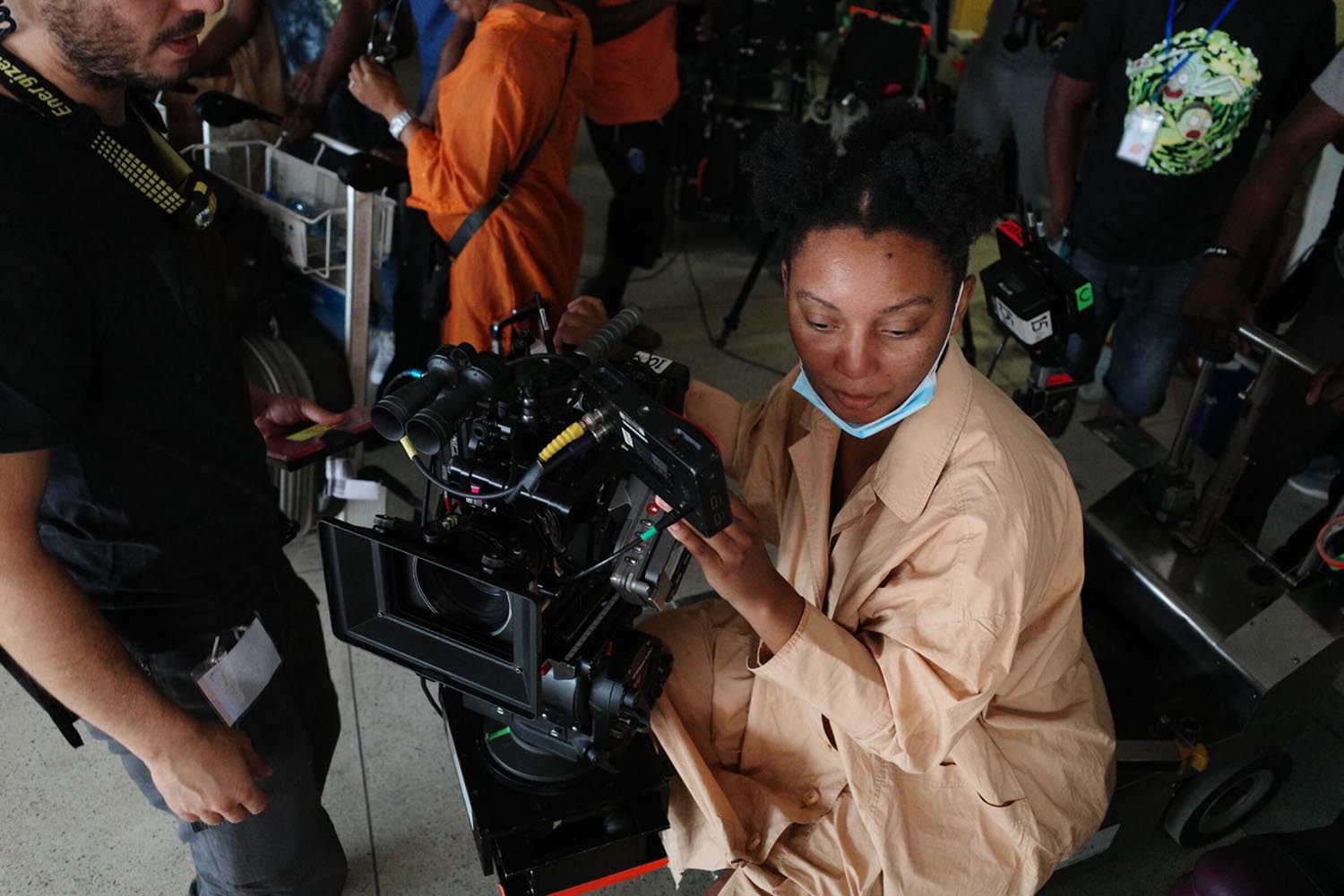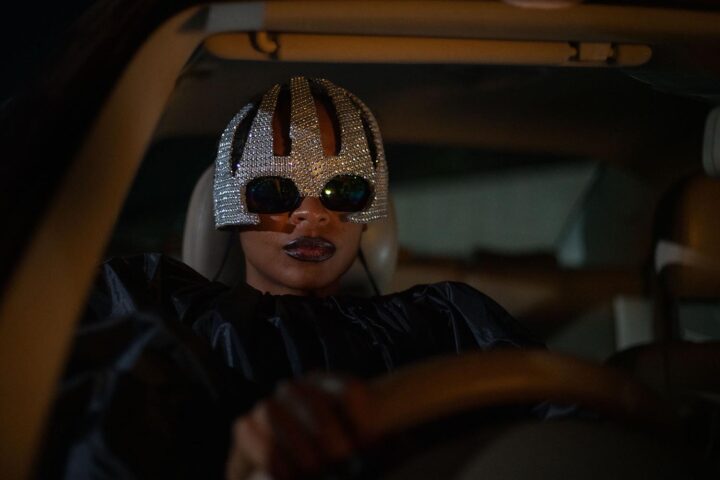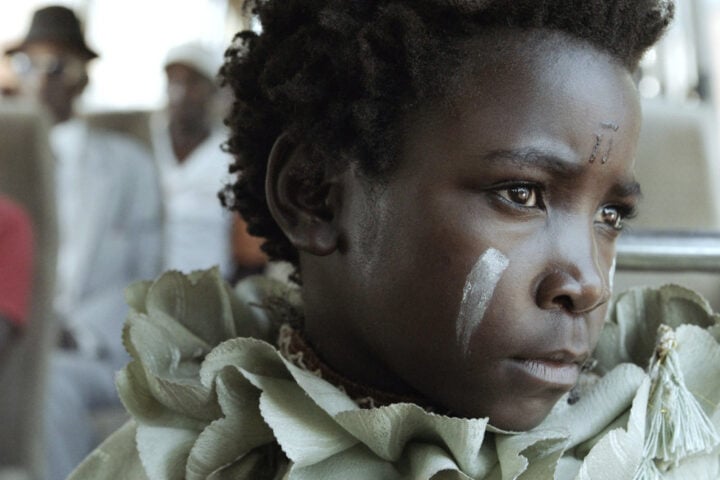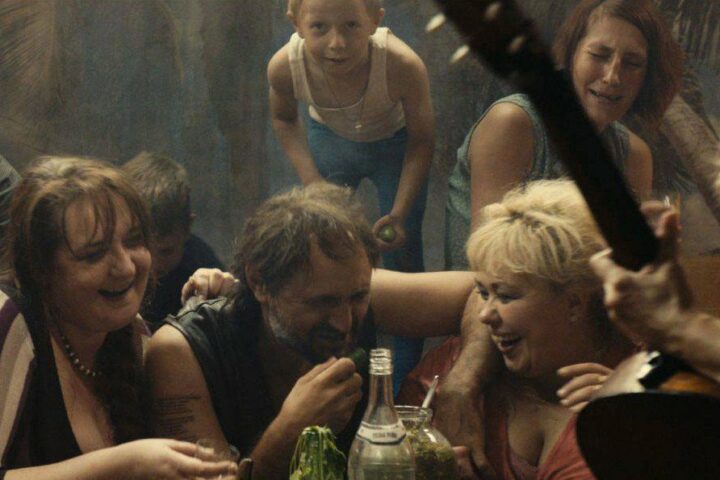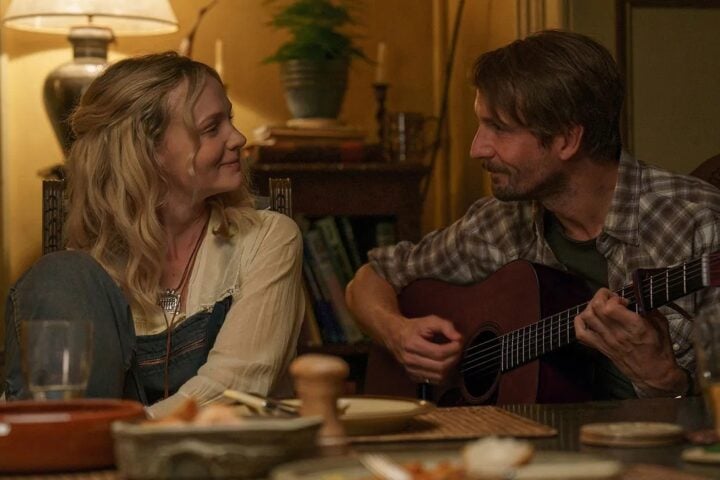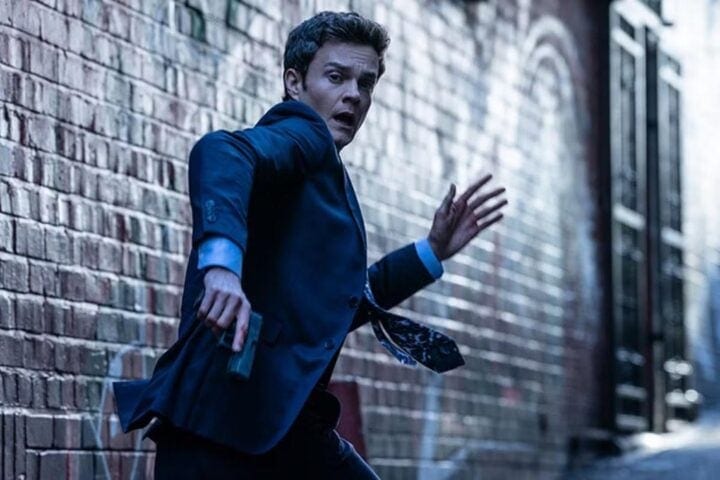As a tight-knit Zambian family grieves the death of a controversial figure in On Becoming a Guinea Fowl, Susan Chardy’s stolid and sturdy Shula receives heaps of unsolicited advice from her “aunties” as funeral proceedings get underway. But one particular bit of criticism seems to stick in her craw when she’s chided for not looking as if she’s just seen a corpse. She responds as writer-director Rungano Nyoni might want her audience to: with a measure of disbelief that there is a “right” or “wrong” way to process traumatic events like death.
On Becoming a Guinea Fowl recontextualizes a familiar ritual to the country’s Bemba people within a fantastical realm. As a children’s program viewed by characters in the film explains, the titular bird is useful to all manner of species across the African savanna. When a predator approaches, the birds make a collective noise that warns all in the vicinity.
Throughout, Nyoni’s blends that mythic quality of the guinea fowl with the mundanity of modern Zambian life, equating the cries of the birds to that of women and predators in their own midst. The recently deceased “Uncle Fred” might have departed this world, but his sins of abuse against members of his own family didn’t disappear with him. As the customs associated with memorializing the dead get underway in earnest, Nyoni and Chardy fearlessly confront the contradictions that allow hollow grief to be vocalized but force sincere trauma to remain silent.
I spoke with Nyoni and Chardy ahead of On Becoming a Guinea Fowl’s theatrical opening in the United States. Our conversation covered why Nyoni continues to recycle the name of her protagonist across projects, how they collaborated to develop the inscrutable character of Shula, and what the film’s ending means to each of them.
Both of Rungano’s films feature protagonists named Shula, which means “to be uprooted.” What does that name mean to each of you?
Rungano Nyoni: Shula is my grandmother’s name, who I never got to meet, and my mom wanted to name me on behalf of her. In our culture, if you name someone on behalf of somebody, you take their characteristics. Shula, my grandmother, was a pioneer. She lived under colonial rule, but she broke traditional rules, cultural rules…all the rules. She was known to be very stubborn and independent, and we grew up under her mythology. It worked because it made us want to live up to that. She was a very commanding person, so that’s why I name all my characters that. It’s always something I pencil in, and then I’m like, “I’ll figure out what the name is closer to the time.” Shula’s a great name, I’m going to use it again for the fifth time! [laughs] The first Shula was in a short film and probably was closer to how I imagine the real Shula was like. They get more quiet as I write different versions of them.
We learn something important at the end, obviously, but abuse doesn’t feel like a silver bullet to explain everything about Shula in On Becoming a Guinea Fowl. How were the two of you building the character?
Susan Chardy: She’s a lot more than [the abuse] for me. When we did the improv sessions and workshops with Rungano, we would try out different scenarios. At certain points during the film, that part of her obviously is with her, but it’s not at the forefront of everything she does. And she’s also a really strong character, especially for her age. She carries the burden and the responsibility for other family members, even down to some of the adults. She’s the one who gets called to boarding school. She’s the one who Bupee’s mom calls and is with her in the hospital. Granted, her mom is also outside in the waiting room at some point, but I feel like she’s been given so much of a bigger load than other people her age.
Even in my own life, being half Zambian and growing up there, you see that we tend to grow up a lot quicker than other people my age. When I was coming back to England and playing with friends here, there’s a different level of understanding of life and maturity. There’s definitely a lot more to Shula, knowing that about our culture and where I’ve come from in my life between the two cultures I’ve lived in. There’s a lot more depth to her. Yes, she’s gone through this trauma in her past, but it definitely doesn’t define her—as the last scene tells me, especially.
RN: There was a fear when I was writing it because it starts off with Uncle Fred, obviously. I was scared that it was all we’d ever see of her. I wrote scenes in before when you see a life outside of this trauma trigger, but then I thought, “No, it’s a bit of a cop-out.” Hence why [you have] the Missy Elliot costume [in the opening scene]—maybe [so] you can get an idea of how she is outside of this one moment! It’s difficult to insert, but you see how she interacts with the cousins so she’s not defined by it. It’s difficult to balance, but I was trying to always find [other] moments. When I was speaking to them about their character, I never said, “Yeah, but don’t forget you’ve gone through this, so I want to do the scene this way.” I never really did that. I just wanted to just take each moment as their characters and then figure things out in each scene.

How did your rehearsal process shape the character of Shula? Was it important to discover her not just in isolation since she is a more introverted character?
RN: I auditioned Susan four days before we shot. She flew in on Monday, and we were shooting on Wednesday. She had a lot to catch up on, so we did a run-through with the [most important] scenes. I don’t know how she did it, because when I look back, it was chaotic. On my sets, I like all the actors to take responsibility for their own characters. I usually go [away] in rehearsals; I’ll tell them what they need to do, and then they discuss it together. I’m not part of those discussions because I don’t want them to perform things to please me. So I always leave, then I come back, and then I correct, amend, and question why they made a choice.
SC: We had a natural chemistry among us when I arrived. I think I was just really happy to be home. There was that excitement and energy for me. We started to speak, and I felt like I knew them. But I think that’s more on the Zambian and Bemba culture side of things. We just all connected. Of course, going into it, I remember when you finally sent me the script…[laughs]
RN: You’re the only one who got it! Because it was an SOS moment.
SC: I was reading it over and over again on the plane. Then, when I got there, [I did] feel this sense of pressure going in so close to the beginning of the shoot. There was no real prep on ground for me when I got there, but I just felt at ease.
Did making On Becoming a Guinea Fowl change how you think about rituals like those surrounding grief and burial?
RN: It’s different. Susan, you left when you were young, and young people aren’t allowed to take part in these grief rituals. You’re allowed to maybe go to burial, but there aren’t a lot of children at funerals. You tend to take part in them [starting] maybe [in your] mid-20s. I only started experiencing funerals when I was going to Zambia much later, when I was older. For me, because I always say I’m a part-time tourist in my own culture, I love funeral rituals. I’ve been to British funerals, Zambian funerals, and German ones, and I like the idea of it being cathartic. It just comes out, right? It’s so choreographed, so you know what to expect. When everything seems confusing, it anchors you to something because all you’re involved in is all the ritualistic things like making food. You know where your place is and what you have to do.
That part, I like about it, but when I wrote this, I was grieving my grandmother and I got so tired. I was so exhausted because I had just gone to another [funeral] a few months prior. A few weeks before, I’d been to my uncle’s funeral and I was just exhausted. I’m resentful that the women do more than the men, I just have to put that out there. We do everything! But that’s something else. I remember thinking, “God, what if I didn’t love this person? How taxing would this be on your mental health?” All these things you do—the cooking of the food, the taking care of uncles and aunts, cleaning up after—it’s a sign of love for the person who died because you’re taking care of the people who they loved. I enjoy that, but it’s the balance between what I have to do and what my male cousins have to do that ends up being a bigger thing. But it brings us together because all the girl cousins are just in the pantry moaning and complaining, and then we just get on with it. But Susan, I know you had a different experience.
SC: As Rungano said, I left quite young, so I never went to a funeral. My younger sisters did, but I never went to a funeral in Zambia. For me, it was a learning process and a discovery, which was fascinating. There’s something about Zambian voices when they sing from a certain place. It’s very spiritual and so beautiful to be a part of. I remember sometimes on set, I would almost be lost in it—obviously, not when in front of the camera. But when I was off to the side and they would be singing, I have goosebumps thinking about it now. It literally would just have this effect on me, and a quite emotional effect as well. It was just a wonderful place to be for me to reconnect with my culture as well because I hadn’t been back for about six years. I learned a lot about the tradition and the do’s and don’ts from the aunts.
The funerals are such fascinating performances of choreographed public grief. Could these traditions be the blueprint for how people, in Zambia or elsewhere, begin to vocalize the trauma of abuse?
RN: I read a lot about Bemba culture before Christianity came, and it was really interesting how people solved problems [together]. I wish, in a way, that we’d go back to that. The funerals are reminiscent of a time when whatever problem you had [needed] to be solved with the family. That’s why [Shula] says, “Oh, you discussed my abuse with the sisters?” It’s like a leftover version of that, but it’s just been warped. It used to be that you took a problem in the family, then everyone gathered around and spoke about how to solve the problem, and everyone had to agree. In other cultures, it’s much more prominent, like the San culture in Namibia and Botswana. I like the idea of it being collective, because it’s a collective responsibility.
But now, where the culture fails is because they either weaponize or exploit in a way that serves the patriarchy in the end. Christianity is what makes our culture patriarchal, so it’s Christian versus Bemba culture. You find all these contradictions that somehow don’t make any sense. And it’s been true in my family, some things are solved collectively—even marriage. If you have a problem with your husband, you speak to your husband, but you [also] speak to your husband’s family. It used to be really nice. If you’re experiencing domestic violence, everyone in the family would know about it and they’d try and solve it. If they don’t solve it, divorce will happen then and there. This is what I like about the collectivity of it, but now it’s warped. And each family has its own little culture, so that’s where I think it fails. But in terms of how to approach talking about these things, that’s the question I’m asking myself every day!
It’s not an issue so easily solved!
RN: No, it’s still a conundrum to me. I’ve been asked this before, and I don’t know, to be honest. We had our own mini-#MeToo called #BelieveUsZambia that came and went. It was very short, maybe six or eight months, and then sort of died.
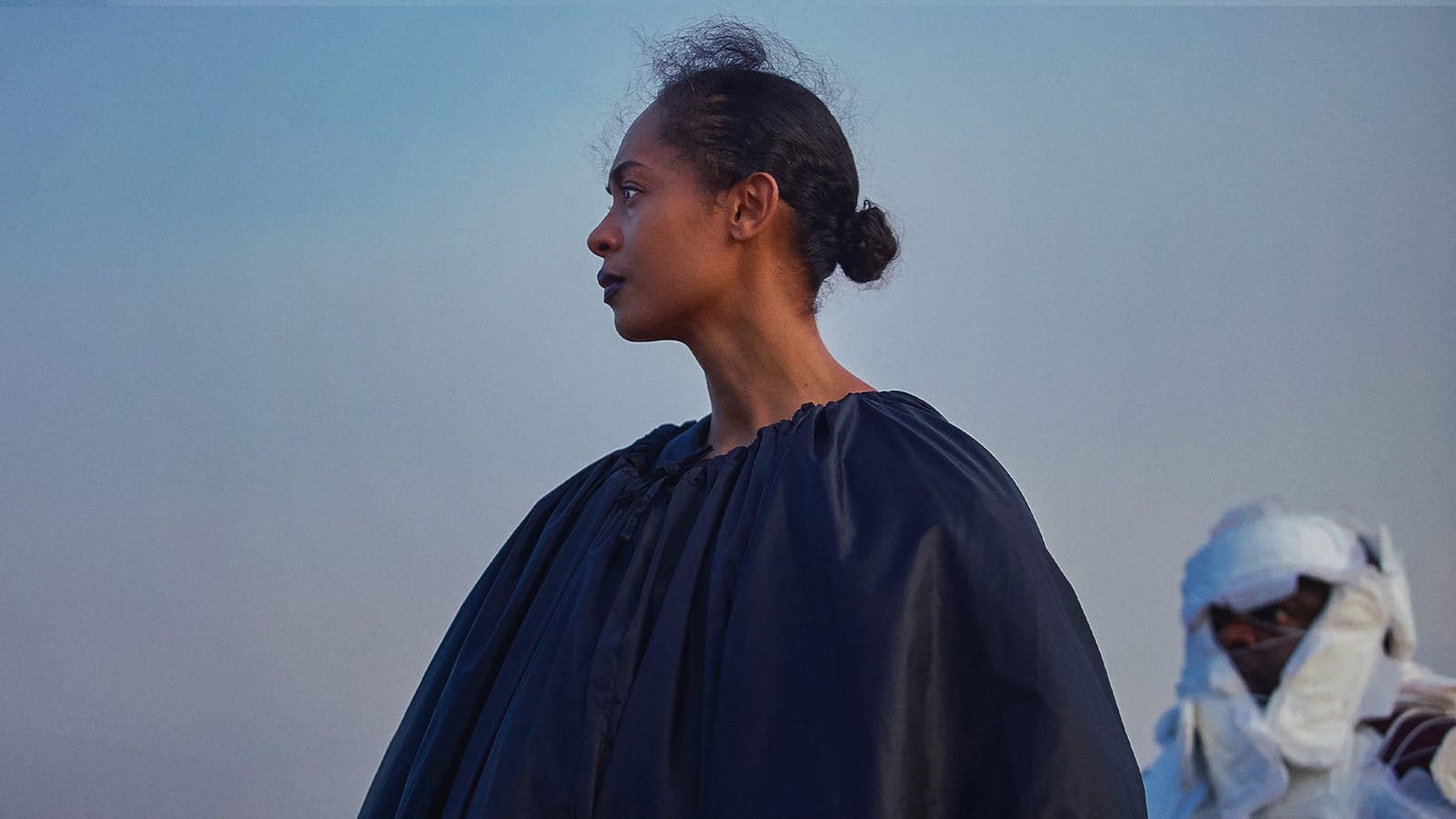
How do you each see the message of the guinea fowl cry that ends the film? Is it something easy because you could explain it to a child, or is it something hard because it requires an expression that doesn’t belong to our species?
SC: It’s funny, a few people have asked this question, but everybody adds something different. I don’t think I’ve really answered it the same each time, because each question comes with a different aspect or feeling to it. I’ve never thought of it [in terms of explaining] it to a child. That scene and the library scene are my two favorites. If you close your eyes and listen to the last scene with the contrast between that [guinea fowl] cry and the noise, there’s something really unnerving about it. There’s a lot of anger and rage that comes up in me when I see that scene.
What I would like to say to people, without saying too much about what’s happening in the scene, is that it comes from a place where you finally find a way to give that rage energy and direction. You can make your own ending, but I saw it as more of a positive thing and a step in the right direction. It was courage in my mind, a decision to do something about it in my mind.
RN: For me, it’s a bit different. I got obsessed with guinea fowl because of a parable that existed in the film that one of the characters said. I was reading loads of Bemba parables at the time, [including] this guinea fowl one about collective responsibility. It was something like when guinea fowls are attacked by a hunting dog, they can escape if they work together. I got obsessed with it, and I started researching about guinea fowls. I thought, “This is it! I don’t know what the guinea fowls have to do with trauma, but they’re saying something to me.” I found out they’re really symbolic in terms of healing and resistance in sub-Saharan culture.
For me, the last scene with the widow epitomizes the film for me. She’s so restrained, and she doesn’t have a confrontation. People ask, “Why doesn’t she have agency?” There’s not that [confrontational] moment that people expect, I think, when they watch it. For me, what epitomizes the film and the feelings behind it is the window. When I was watching the rehearsals, it wasn’t supposed to be how it was. But when I was watching it, I got so riled up because it epitomizes women as a scapegoat and how you can’t sort of escape. It ends up being a cycle. I don’t know why I did it. I was just thinking that she starts off in a car in darkness, so I definitely knew the last scene had to be full of light. It had to be the opposite.
Personally, I like that everyone interprets it differently, but it’s more fantastical for me. Hopeful but fantastical. It’s to epitomize the feeling of what we watch the women go through, the frustration that builds up, and then breaking that frustration up with something else. I was guided more by my gut. Even the sound of the guinea fowl we were auditioning on set. How she was going to do it, where she was going to walk up to, all these decisions are not [made] before. I might be able to know what it meant years from now, but I know what it meant. It’s idealism. That’s what I lack because I’m usually quite skeptical.
I have to ask: By “auditioning on set,” does that mean you were auditioning the guinea fowls themselves?
RN: No, no, I just meant the sounds! They make different sounds, and I’m not sure that was the sound of alarm. But it sounded the most dramatic. It could be a mating sound, for all we know!
SC: And you made me audition the sounds too! I had to do the guinea fowl sounds.
RN: She had to do guinea fowl sounds, and we mixed her and the guinea fowl together! The actual alarm sound of the guinea fowl was a bit unspectacular, so I was like, “Well, I’m not having that one. Let me have this cool one, which probably means: ‘Oh, will you be my mate?’”
Since 2001, we've brought you uncompromising, candid takes on the world of film, music, television, video games, theater, and more. Independently owned and operated publications like Slant have been hit hard in recent years, but we’re committed to keeping our content free and accessible—meaning no paywalls or fees.
If you like what we do, please consider subscribing to our Patreon or making a donation.

